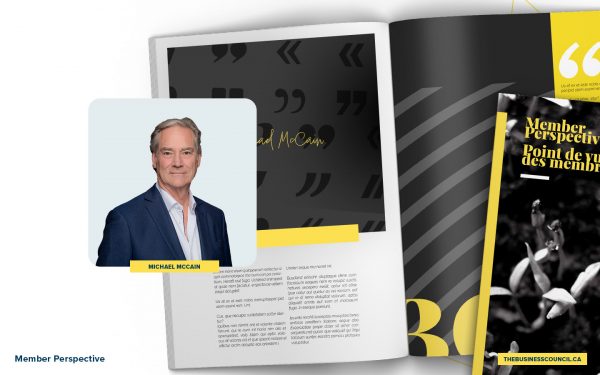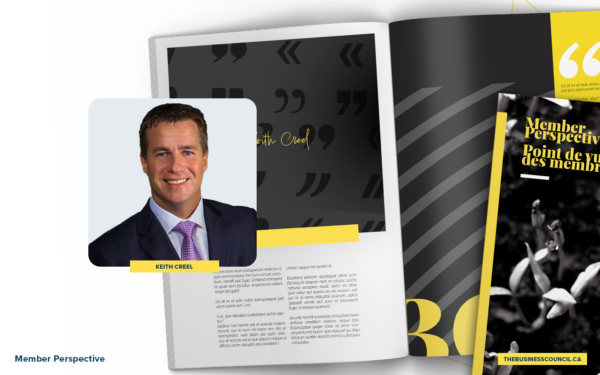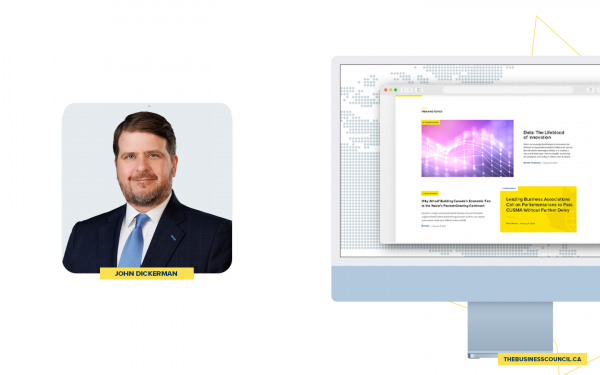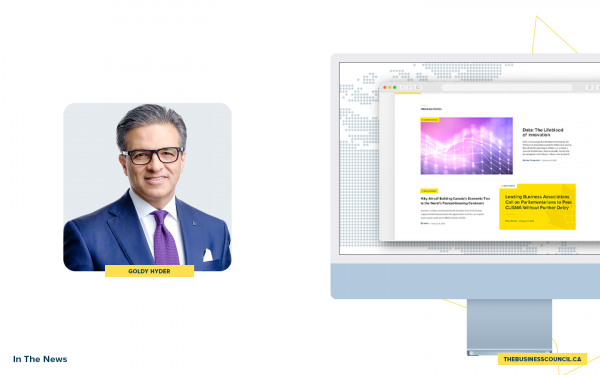Downtowns after lockdowns: how to revitalize Canada’s cities
A year into the COVID-19 pandemic, most of Canada’s downtowns remain eerily quiet. Millions of people continue to work from home, leaving office buildings close to empty
But Jon Love, founder and CEO of KingSett Capital, believes Canadian cities will bounce back after the pandemic.
The reason? Connection.
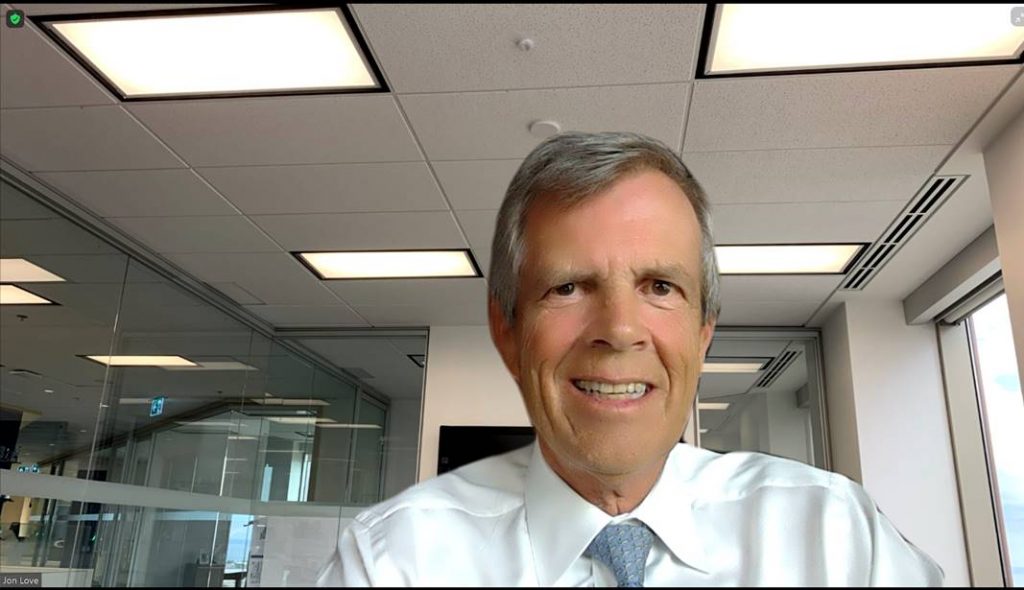
“We can connect digitally, but it’s so different than connecting live,” he says. “Relationships are the currency of business. And connection and relationships are built in-person. They can be maintained digitally, but the fact is new relationships – or building relationships or the nuances of relationships – are very tough online. You cannot schedule spontaneity and creation.”
Love says office buildings have changed with the pandemic, resulting in new experiences for people when they return to the urban core. He points to Toronto’s iconic Scotia Plaza. Whether you arrive by car or subway, you now don’t have to touch a surface to get to your desk. Meanwhile the air filtration systems in the building are now as effective as in a hospital. “It’s really an acceleration of trends that were already there, but it’s moving them aggressively ahead.”
Will that be enough to entice people back downtown? Love is optimistic. “At the end of the day, we’re social animals … Most of us enjoy the interaction of someone else where it’s spontaneous, where you walk in and you just say to the person working next to you, ‘How was your weekend? What’s going on?’ We need that connection.”
To hear the full conversation with Jon Love, including how Scotia Plaza became Canada’s largest zero carbon building, click on the podcast.
Latest Podcasts
Transcript:
Jon Love:
I think that, as we look to reenergize our lives in our communities, that there will be a new dawn. And it’s out of that new energy, after being locked up and Zoomed to death, I’m hopeful that, as Canadians, we can go arm in arm and say, “We can do things.”
Goldy Hyder:
Welcome to Speaking of Business. I’m Goldy Hyder, president and CEO of the Business Council of Canada. I’m speaking to you from downtown Ottawa, which these days is one of the loneliest parts of the city. Office towers are eerily quiet. Food courts are sparsely populated. Many coffee shops, sadly, are closed. It’s a scene repeated in cities across the country as Canada continues to grapple with COVID-19. More than a year into the pandemic and millions of people are still working from home.
Goldy Hyder:
Now, don’t get me wrong. Canada’s quick pivot to remote working was essential to helping stop the spread of the virus. But what will the lasting effects of working from home be on our cities? How will our downtowns look and operate in a post-pandemic Canada? Will they change? And how could climate change factor into the future of cities?
Goldy Hyder:
My guest today has pondered these questions and a lot more, often from his office in the heart of Toronto’s downtown. As the founder and CEO of KingSett Capital, Jon Love oversees a wide range of real estate investments including office towers, shopping malls, apartment buildings, industrial complexes and hotels. These are the buildings that make our cities vibrant, active places. What’s their future?
Goldy Hyder:
Welcome to the podcast, Jon.
Jon Love:
Thank you, Goldy. Pleased to be here.
Goldy Hyder:
Look, there’s so much ground to cover. First of all, I think it’s just wonderful how active you are on social media. And you’ve been really sharing, most recently, on a variety of different topics. And I hope to kind of dive into all of these with you. But let’s start, first and foremost, with you’re at your offices, I want you to look outside and I want you to tell us what you see right now.
Jon Love:
Well, what you see is a lot less of what you used to see. And regrettably, we’re in the circumstance where everybody is being encouraged to stay home, that anybody that can work from home is urged to do that. And by and large, everybody’s doing that and obeying the rules. Our particular businesses all work from home. And we’ll obey those guidelines until they’re changed.
Goldy Hyder:
You mentioned things are not as they used to be. What do you notice? What’s missing the most in downtown? I know you’re in Toronto, but really, all across this country, the downtowns seemed to be hollowing out. What are you missing?
Jon Love:
Connection. And if you reflect on that one word, we can connect digitally, but it’s so different than connecting live. I mean, in my normal routine, it turns out I eat out lunch every day. All five of those are with other people. I will walk to that restaurant in the underground in Toronto. And on my way, I’ll see at least three people I know. And one will be a catch-up, one will be, “Geez, I’ve got to phone that person back about something.” And one will be a new experience.
Jon Love:
And relationships are the currency of business. And connection and relationships are something that is built in person. They can be maintained digitally. We’re all doing the best we can. But the fact is, new relationships or building relationships or the nuances of relationships are very tough online. You cannot schedule spontaneity and creation and say, “Well, let’s do that Thursday at 11:00.” It doesn’t work.
Goldy Hyder:
Yeah. Well, I’d like to remind people, as effective as these digital calls can be, there’s no easel where I can take the felt from you and say, well, what if we did it this way, John?
Jon Love:
Well, that’s the other thing is if you and I were having lunch, you might have an 11 minute agenda of yours, but we would have the other 79 minutes, which would cover, who knows what it would cover and what we would learn about each other and what opportunities we might think of how we could collaborate together in the future.
Goldy Hyder:
Well, let’s drill down on that, this whole notion of early out of the gate, working from home was seen to be like, oh, this is the new way. This is how we’re going to do it. And productivity is far better was the assertion out of the gate. I think you’ve heard and I’ve heard from many people who say, “Bah humbug. That is not the case. The productivity is not going up.” And particularly women feel that way. What are you hearing from your own clients, your own colleagues and others on the whole working from home and whether it is really a long-term phenomenon?
Jon Love:
So I think it’s sort of migrated from working from home to sleeping in your office because really the paradigm has changed. And I’ve seen the thinking process change pretty dramatically because it’s true that in the first number of weeks, when everybody went online, that kind of life kind of carried on. But increasingly over time, people have drifted. It’s hard to get people together. It’s hard to get the creativity, the spontaneity and coaching, culture, all those things that are essential in building a career, building a business, are missing. The CEOs I talk to, and I talk to a lot of, I mean, obviously as you do, but I mean, I talk to a lot of our customers, can’t wait to get back. And which is why we’ve got a We’re Ready program, a Work Safe program and the innovations we’ve done in our buildings of every asset class has really been pretty interesting.
Goldy Hyder:
Can you talk about that? I want you to drill down deeper on what it is that you’ve done in the last year to get ready for whatever the new normal is going to look like.
Jon Love:
So it’s different depending on what buildings you’re in. But if you take office buildings, for example, Scotia Plaza, the building that our offices are in. Whether you arrive by car or subway, you now don’t have to touch a surface to get to your desk. Secondly, the air filtration now in the building is the same as in a hospital, not the surgical suites, but just the regular spots in the hospital. And then we’ve also obviously implemented all sorts of other touchless technologies that are really making a difference. And it’s really an acceleration of trends that were already there, but it’s moving them aggressively ahead. And I think when customers come back and tenants come back, that they’ll really be encouraged by what they see.
Goldy Hyder:
Recently, there was I think at least two headlines of major tenants. And of course, as the old saying goes the media reports crash landings not safe ones and somewhere in between was the actual truth on these. So I want you to talk a little bit about the stories that were reported that people are leaving the penthouse suites. They’re leaving downtown and they’re moving out. What’s really happening?
Jon Love:
Well, what’s happening is The Globe and Mail didn’t call us. And The Star did.
Goldy Hyder:
Shocking.
Jon Love:
And The Star did and The Star got it right. Because what the story is is almost four years ago, the Bank of Nova Scotia decided to expand their core footprint by taking more space in Bay Adelaide North. And they took about 420,000 feet. At the same time they wanted to accordingly right-size their Scotia Plaza space and bring it down to a million and one. So these discussions have gone on for two and a half years. And we said we’d be grateful if you give us the top space back and consolidate the bottom. And so that was the deal. The deal that was done was on pre-COVID space requirements and pre-COVID economics. And the aggregation of the two buildings, they’re going from a million four to a million 520.
Jon Love:
Now, what is going to happen, what the Bank of Nova Scotia is doing and I think what you’ll see other banks doing, we can point to them is they are consolidating their footprint into their core premises and they’re making deeper commitments in fewer buildings. And I think you’ll see the banks, which all of them are in 20 or 30 locations around the GTA, consolidate that into a much smaller number. And obviously banks all have big contingency centres. And we all know now the contingency is work from home and that won’t change. So those contingency centres are no longer valid. And they’re going from a number of things like that. But I think the other things that you’ll see, you’ll also see large employers looking to trim employment levels, AI and other things, which is just accelerating trends that are already in place. But the net net for the core is we’re seeing actually increased commitment in the core. And the one newspaper sort of missed that. The other newspaper reported on it and got it.
Goldy Hyder:
Well, it’s interesting you mentioned increased commitment. I’ve often said that while people are talking about how COVID is going to change things as we look forward, in some ways, I think it’s actually taking us back to what was. And people had offices. They weren’t in these co-creative spaces, they weren’t packed into workstations. Do you see that that’s why space is increasing?
Jon Love:
I think it’s too early to tell. It depends what the hangover is like, whether it’s fast and we move on or whether it lingers. I think work from home will be a component of the workplace. There’s no question about that. But I think that it is one of those where many people will say, “I’d like to work from home on Friday.” They say, “Well, actually, Goldy, you’re the Thursday guy. And Amy, you’re the Tuesday person.” So they’ll have to sort those issues out. And then if you’re a young person and you’re in a firm and you’re ambitious and somebody says, “Actually, Goldy, why don’t you work from home full time?” That’s not going to end well for you. So I think the reality is we’re going to have some differences. I mean, there’s been lots of talk of the six foot office and where you physically sit that you’re not within six feet of somebody else.
Jon Love:
If you look at meeting rooms and the implications of meeting rooms, meeting rooms that used to take 12 now take six, 24 take 18 or 12. So there are huge consumers. And so there will be lots of thinking as we go through this. But my core view is at the end of the day, we’re social animals. And most of us don’t want to sleep in the office. And most of us enjoy the interaction of someone else where it’s spontaneous, where you walk in and you just say to the person working next to you, how was your weekend? What’s going on? We need that connection. And I think the mental health implications of this nine months of working remotely are pretty big because we’re asking a lot of our young people to be their children’s playmates, caregivers, teachers and friends. Plus we’re asking them to work. And that’s a pretty tall order for anybody. And it’s good to see that the school’s back live again, because I can tell you, I know lots of young people that were at the end of their ropes.
Goldy Hyder:
Right? No. I certainly hear that story a lot. Just before we leave the COVID issue sort of behind, at least momentarily, a couple of quick things. One is how do you think buildings might evolve as a result of this pandemic? Do you think that the way we introduce childcare, will there be more public health facilities in buildings potentially to deal with things in the future? Do you sense that things may change on that front?
Jon Love:
Well, we’d love to be able to do that if only the government would allow us. The biggest block to childcare is municipal regulations on the definition of what a childcare is, which often doesn’t make it very easy to put that in a dense environment. It’s unfortunate that planning, which is largely focused on a city like Kapuskasing, doesn’t realize that in downtown Toronto, you’ve got different issues. That’s the biggest stop for social infrastructure delivery. Anyway, but from the private owners, you’ll see touchless everything from washrooms to entrance doors to everything else. There will be hand sanitizer stations that are everywhere. Air filtration and cleansing and sanitization are a totally different protocol.
Jon Love:
And in a big building, if we find that one person had a COVID case on the floor, we vacate the floor and we do what’s called a 360 bomb, which now is we’ll sanitize everything in that floor in a number of hours and then it can be used again. And we’ve practiced these protocols and it’s sort of like practicing fire drills and we’re getting better and better at it. And I would say that from a biosecurity focus, which is a big issue, and the industry is all working together, that we’ve made real progress.
Goldy Hyder:
One of the things that you’ve done that probably helped with the mental health of a lot of Canadians is you were instrumentally involved in one of your hotel properties, the Royal York that housed the NHL players last summer, that allowed for hockey to be played in a bubble. Just tell us briefly about that experience. How challenging was it and how proud of you are of how well it went?
Jon Love:
Well, if you want to talk about a pivot, on the second weekend in March, the Thursday was the 12th, the hotel was a sellout, had been a very robust first two months, then COVID on Monday. We had to lay off hundreds of people. And that is heart-wrenching. Forget about the economic consequences because you’re dealing with people’s lives, people that have worked in the hotel sometimes for years, sometimes for generations. So our first pivot was to build our Rest Safe program, where we worked with the downtown Toronto hospitals, implementing a program of free rooms for their healthcare workers in a COVID exposed crisis. And we had several thousand discreet, unique visits, not one COVID case. So the Royal York figured out how to move from this bespoke service model to touchless service, quite a cultural change.
Jon Love:
Then with hockey, that was next up and the NHL wanted a bubble. And boy, I’ll tell you, they had a really, really tough set of facts, but we met them. But they imprisoned those players. It was a pretty tough environment on the players because they were in prison. Now, we created all sorts of things they could do inside the the prison from exercising to sort of getting out and socializing with each other. So the only disappointment of the NHL bubble was we sort of thought they would eat and drink their way through the time. And they were just well behaved young men. It was very disappointing.
Goldy Hyder:
Well, as I said, I think many Canadians are grateful to you for that. So look, we could talk about this the whole session, but I do want to tap into other areas that I know are very important to you, and they’re important to our listeners. One of them is the issue of climate change. And it’s an area that you’ve been quite active. I mean, you’ve been awarded, I think your second tallest office tower has been certified as a zero carbon building. You’ve received awards for the kinds of things that you’re doing. What’s your philosophy in how we tackle climate change?
Jon Love:
So as owners of real estate, let me talk about that. And then I’ll talk about me personally. As owners of real estate, we are leaning as aggressively as we can into an ESG strategy. And the E component of that strategy means getting to a carbon zero footprint. And it is attainable. We’ve done it in Scotia Plaza, which is actually a huge consideration. And because it’s the largest existing building to have that certification. But we’re advancing programs everywhere else. And we’re hopeful that within 10 years, not 30 years, within 10 years, that we’ve basically got this program done because it’s my core view that whether you’re an apartment renter or a office tenant or a retail tenant, whatever, that given a choice, you’ll align your consumption with someone whose ESG strategy is more aligned with yours. And these are very complicated programs. You can’t turn them on and off with a switch or get it done in two weeks. And so we’ve got three dedicated team members. We invest tens of millions of dollars a year on this. And it’s a big focus for us. We want to aggressively lean into this strategy.
Jon Love:
In a broader context, I think the narrative in Canada has to be how can we as a country really make a difference in this global fight against climate? And I see this opportunity differently than perhaps some others.
Goldy Hyder:
How so?
Jon Love:
I mean, our current government thinks the way to deal with it is to cut our emissions by 20% or 30% or whatever. But our emissions are irrelevant on a global scale. So that by itself, while being laudible, won’t get anything done. What I’d like to see Canada do is we have the opportunity, and we’re almost unique in this category. We have the opportunity with our excess resource bounty to export that to the world. And we can take much cleaner sources of energy and disintermediate coal. Wouldn’t that be a big idea? I mean, Canadians have the entrepreneurial spirit. We have the resources, we’ve got the capital. If we had the collective vision, we could actually make a difference in climate change globally. And to do that, we would be drawing on the hydroelectric resources in Quebec, in Manitoba, the uranium in Saskatchewan, natural gas in BC, oil in Newfoundland and Alberta. Everybody’s got a piece of this puzzle. And the country, if we work together and set our sights on disintermediating coal, be very interesting.
Goldy Hyder:
What’s holding us back from doing that?
Jon Love:
I think we sometimes trip over our own virtue. The fact is that we lost big thinking. We need big thinking. We need to say to ourselves, let’s talk about big projects that as a country, we could work on together. Free trade, provincial free trade, an energy corridor, energy independence. We can build a green energy corridor. We can do all sorts of things that would have a much bigger vision. And we really need the corporate sector, I think is there. I think the corporate sector would embrace big, constructive and socially responsible initiatives. We need government leadership. And the government leadership we need is to say, let’s put a stake in the ground. Can we use Canada’s skills and resources to disintermediate coal over 10 years? Is that possible? It’s a big idea. Some people would say, “Oh, that can’t be done.” That’s not the point. How can we make a real dent in that project? We need leadership.
Goldy Hyder:
Now, I mentioned off the top that you’re very active on social media and of all of our members, I know it’s authentically you. It’s you. It’s you doing it. You’re very genuine about your points of view. And in some ways, the challenge that I think we face is, is we want to say that it’s the government’s responsibility. The government is wasting the political, the will to do it. But aren’t we really talking here about Canadians? Aren’t we really talking here about the public and to get the public to realize that doing big things is a benefit to them? Is that where we should be putting more of our energies as businesses to communicate with Canadians?
Jon Love:
I think it’s a great point. And I’ve talked about this a lot because people said to me, “Why do you bother with LinkedIn or whatever?” And I think it’s business leaders, it’s our responsibility to speak out, to share our views. People can evaluate them as they see fit, ideally nonpartisan. But talking about what the issue is, not the people. Talking about what the issues are and why they’re important in my perspective, in the building of Canada and the building of equality across the country, because all of our businesses will do better and will only survive in a strong Canada. So it’s in all of our self-interests. And when I say a strong Canada, I don’t mean just certain regions or certain people in certain regions. I mean, we have to have a template where in every part of Canada and no matter where you are on the socioeconomic ladder, that you have an opportunity to succeed because that is the secret of a just society.
Jon Love:
So it is a discussion point. I would love it as more and more CEOs speak out and share with their people and their community what their views are. Smart people, they have a view. I’m tired of sitting in a corner in a private club complaining or sharing views about this, that or the other thing. That’s irrelevant. If you’ve got a view, put it out there. And sometimes people disagree with what I say and sometimes they don’t. But that’s not the point. I’m trying to share the perspective of a business leader on the issues of the day.
Goldy Hyder:
Well, good on you. As I said, I think it’s really important that that happens. Now, one of the issues you’ve talked about a lot as well is something that I hear certainly in talking with our members across the country, and that’s the need for talent, the need for skills, the need for labor. And you’ve written a lot about that and immigration. What’s your sense of where we are and where we need to be as we go forward here on that issue?
Jon Love:
Well, November 3rd, the whole game changed on immigration.
Goldy Hyder:
November 3rd being the U.S. election.
Jon Love:
Yes. I mean, we’ve had a pretty free ride for the last four years because we had a very polarized competitor competing for the best and the brightest. And we look pretty good. We’re socially liberal, beautiful cities, nice people. We look pretty good. So we got very good immigrants and it’s absolutely essential to building our economy. Well, we have to now pivot a little bit because we’ve got to do two things. Number one, we have to realize we have to compete harder to attract new Canadians. And we have to work harder to retain the entrepreneurial and wealth creation skills that are currently in the country. There’s two pieces of this puzzle. Whatever public policy evolves over time, we want to make sure that entrepreneurs, business leaders, wealth creators feel comfortable in Canada, stay in Canada, pay taxes in Canada, build their businesses and employ people in Canada and at the same time, bring in more Canadians, more immigrants. It’s a very constructive strategy. I’m nervous that sometimes entrepreneurial talent, wealth creation and capital, which is very mobile, is taken for granted because this government should not take that for granted.
Goldy Hyder:
Interesting point, in some ways you’ve talked about a philosophy of what I think you’ve described playing offense, as opposed to defense. Where does that come from? Besides hockey analogy, but what makes you think that that’s what’s holding us back?
Jon Love:
Well, I mean playing offense, if you’re running a business and you’re presented with a very difficult set of facts, it can be all too easy that you wake up in the morning and you absorb all this bad news and it’s hard to get off your heels. But no one can win a game walking backwards. So you have to get the strength and the power to get on your toes, to build a plan, set a destination, talk to your people, et cetera, et cetera. That’s playing offense. I think the government’s strategy should be, and post-COVID recovery, they’ve got a number of competing agendas and they’ve got to build in all of that. They’ve got to factor in how do we embrace, retain and enable our wealth creating Canadians who will pay taxes? And how do we attract new immigrants? And to some degree, some of the same issues. But never want to take your eye off that you got to keep that Silicon Valley types in Canada.
Goldy Hyder:
Let’s go to an issue that you and I have talked about when we first met. And that is our love for Canada. We’re going to be coming out of this pandemic in a huge hole financially and in many other ways. What do you think is key? And you mentioned competing agendas, but how do you see the so-called building back better if you will? What are the elements of bringing Canada not just back to where we were, but being even better than we were?
Jon Love:
Well, if we had the power to say how do we work together as a country? Not as factions, not as parts of the country, but how do we work together as an entire country? I would focus on, part of my element would be what are the nation building projects that you could put together that benefit every part of the country? And part of it would be an east west energy corridor that would send Quebec electricity west and western energy east. We need some of these nation building projects that bring us all together around a common set of facts.
Jon Love:
Clearly we’ve learned that we’ve got to build domestic capacity to provide a number of things that perhaps we hadn’t thought we needed that capacity before. But that can’t all be in Toronto and Montreal. It’s got to be throughout the country. And we’ve got to, as a nation, bring ourselves together. And at the same time, I would use the levers that the federal government has to figure some of these things out. Let’s break down the barriers amongst the provinces on free trade. Let’s get to a national financial regulator. Let’s do some of these things which are just so-
Goldy Hyder:
Canadian. So Canadian.
Jon Love:
And let’s get over our small parochial differences between Alberta and Saskatchewan. Oh my god. You’re kidding me. So we’ve got to move on and-
Goldy Hyder:
But Jon, do you feel we can? Do you feel, I mean, look what we just witnessed for the last 11 months? Do you really think, are we going to learn from this?
Jon Love:
It depends. I think leadership is difficult. And political leadership around big ideas is 2X difficult because it’s so easy to deal with the tactical issues of the day. And the difference between building a business and running a business is building a business, you’ve got a big idea and you’re not afraid to put a stake in the sand out there. Our business community could get this going if we weren’t shackled to the ground, but we’ve got to deal with some Indigenous issues. You’ve got to deal with how do you get out of this massive deficit. That said, I would be looking at why don’t we have a high-speed rail between Montreal and Toronto? How could that possibly be that we invented the high-speed train. We sent them all over the world and there’s nothing between Toronto and Montreal. It’s unbelievable. So I would have a list of these things and I’d get at it.
Goldy Hyder:
You don’t want to run for office, do you?
Jon Love:
You know what, the skills to run for political office are fundamentally different. And I recognize that, which is why the role of someone like me and others like me, is we should introduce into the public narrative issues that we’re passionate about. But I would never confuse my skills with that of a good politician, because it’s a long story, but I would never do that. I’m too old and I grew up in Edmonton. So but I think that it is our responsibility to put these issues out here and let’s put some energy behind it.
Goldy Hyder:
So let me ask you, what do you consider to be Canada’s greatest strength?
Jon Love:
I’ve traveled a lot of places. And I’ve never been to a country that is so accepting of others, whether you’re black or white or gay or straight or I don’t even think about all the differences are. In most societies, you are kind of judged on this, that or the other thing. And if you’re a Canadian, you’ll say, “Well, we’re not perfect, blah, blah, blah.” But if you look on a relative scale around the world, this is an unbelievably accepting place. And what I’d like to think is I’ve got permission to act within the law as I see fit, as do you. And that’s fine. And we carry on. And that makes us a great society. And it gives us a very dynamic creative class, gives us dynamic arts and entertainment, and it has huge contributor to the fabric of the country. And this in Canada is unique.
Goldy Hyder:
Well, Jon, we’re just flying through time here and we’re almost out. And I thought I would end with just one question that I’m probably going to make a theme for the rest of these podcasts. Normally we ask CEOs what keeps you up at night? I’m not going to ask you that. What I want to know is what are you most optimistic about for the year ahead?
Jon Love:
I think we’ll get over COVID. We will then embrace connecting with each other, families first, friends second, and others. And I think that we’ll put in the safe guards in our healthcare system and the other things that we need to do as we go down the road. But I think that as we look to reenergize our lives in our communities, that there will be a new dawn. And it’s out of that new energy, after being locked up and Zoomed to death, that I’m hopeful that we could have some big ideas and that as Canadians, we can go arm in arm and say we can do things that can change the world, particularly with climate change, but also have great nation building projects.
Goldy Hyder:
A new dawn and with new energy, great place to wrap. Thanks so much for doing this, Jon.
Jon Love:
Thanks, Goldy.
Goldy Hyder:
Jon Love is the CEO and founder of KingSett Capital. Now Jon talked about big ideas and this spring we’re exploring many other big ideas to help Canada grow stronger together. In a couple of weeks, I hope you’ll join me when I speak with Sabrina Geremia of Google Canada. We will discuss the increasing importance of lifelong learning and skills training to help power a strong recovery. Here’s a preview.
Sabrina Geremia:
There is this stat that is 40% of work is going to be impacted by automation. And the misnomer is that it’s 40% of jobs. It’s actually 40% of work, which means that every single person will have an aspect of their job that will be working alongside digital tools, technology, et cetera. And so every worker needs to continuously train as these tools evolve.
Goldy Hyder:
You can hear more from Sabrina Geremia on the 22nd of April. And remember, to hear all of our Speaking of Business conversations with innovators, leaders, and entrepreneurs, why not subscribe? You can find us wherever you get your podcasts or go to our website, thebusinesscouncil.ca. Until next time, I’m Goldy Hyder. Thanks for joining us.






